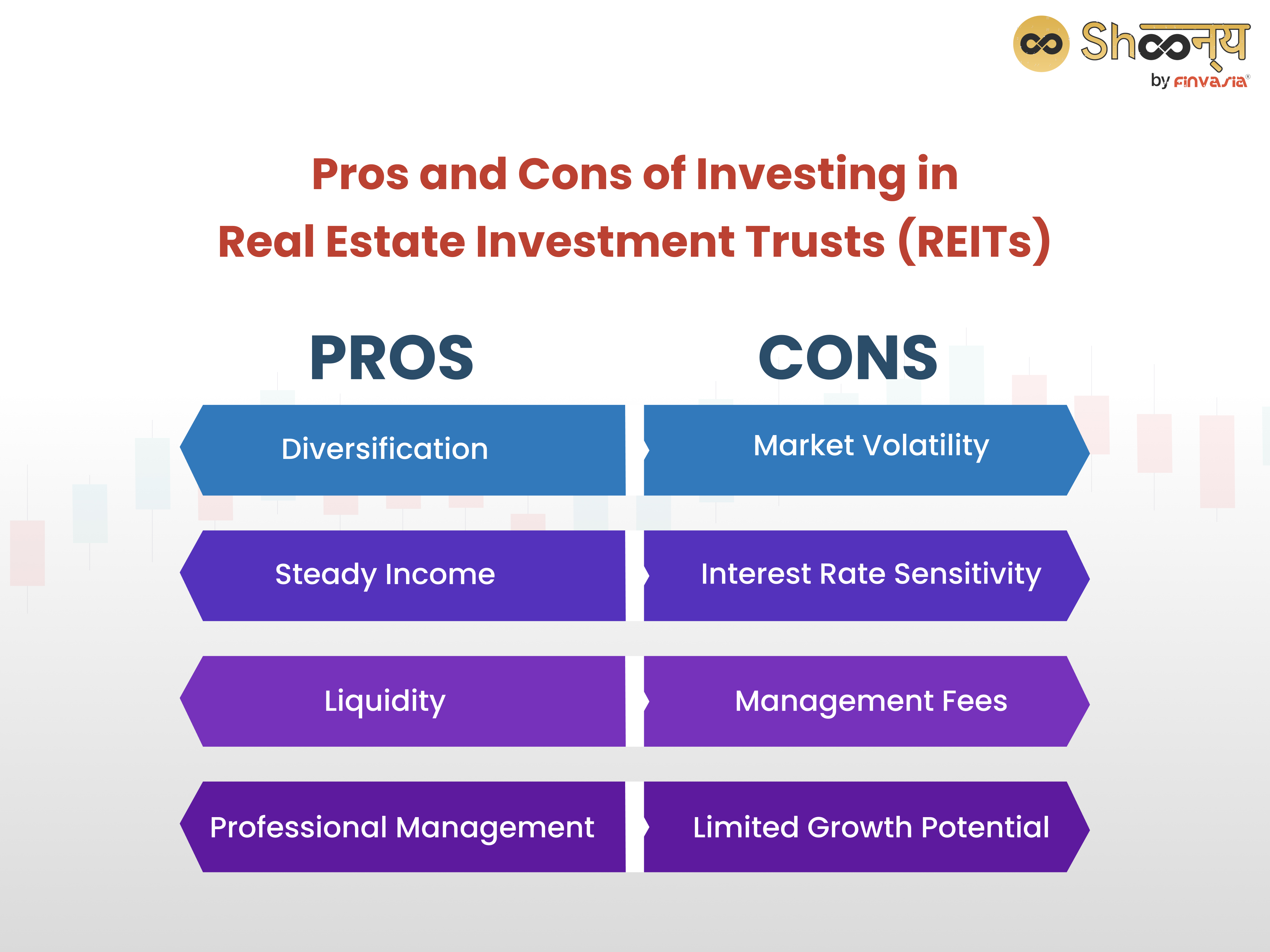Real Estate Investment Trusts (REITs) have emerged as a popular investment option in India. What is so special about them?
REITs offer you a way to take part in the real estate sector without directly owning properties.
Now, how does that happen?
REITs pool funds from multiple investors to invest in income-generating real estate assets. This could be commercial properties like office spaces, shopping malls, hotels, or residential properties.
Let us take a look at this amazing investment option in the Indian Stock Market- REITs it is!
REIT Meaning
A Real Estate Investment Trust (REIT) is a company that owns, operates, or finances income-generating real estate. It allows investors to invest in real estate assets without directly owning them.
REITs distribute a major portion of their income (usually rental income) to shareholders as dividends.
A Real Estate Investment Trust (REIT) is like a mutual fund but for real estate.
Here’s how it works:
When you buy shares of a REIT, you’re essentially buying a portion of these properties.
The rent collected from tenants is distributed to REIT shareholders as dividends.
So, by investing in a REIT, you can earn a share of the income from real estate without having to buy or manage properties yourself.
Why are REITs popular?
REITs are popular because they provide regular income and the potential for capital appreciation (increase in share value). However, this depends on property value changes.
Plus, a Real Estate Investment Trust offers diversification since it invests in various real estate sectors.
In India, SEBI (Securities and Exchange Board of India) regulates REITs. It requires them to distribute a major part of their income as dividends, making them attractive for income-seeking investors.
Real Estate Investment Trusts are also traded on stock exchanges like regular stocks, so you can buy and sell them easily.
Types of Real Estate Investment Trusts
In the Indian market, there are mainly three types of REITs listed:
- Embassy Office Parks REIT
- Mindspace Business Parks REIT
- Brookfield India Real Estate Trust.
- Embassy Office Parks REIT:
- Embassy Office Parks REIT is India’s first publicly listed REIT. It primarily owns and operates a portfolio of high-quality office spaces.
- These are located in 4 key Indian cities, i.e. Bengaluru, Pune, Mumbai, and Noida.
- Embassy Office Parks REIT is listed on stock exchanges.
- Mindspace Business Parks REIT:
- Mindspace Business Parks REIT owns a portfolio of business parks located mainly in Mumbai, Pune, Hyderabad, and Chennai.
- Brookfield India Real Estate Trust:
- Brookfield India Real Estate Trust is backed by Brookfield Asset Management, a global alternative asset manager.
- As of September 30, 2023, this real estate investment trust valued at ₹285B.
These REITs invest in commercial real estate assets.
- Equity REITs
These real estate investment trusts own and manage income-generating properties like office buildings, shopping centres, hotels, or apartments. They earn money from rent, and property value increases.
- Mortgage REITs (M-REITs)
Also called mortgage-backed REITs, these invest in real estate mortgages or loans. They make money from interest payments on the mortgages they hold.
- Hybrid REITs
These real estate investment trusts combine aspects of both equity and mortgage REITs. They invest in physical properties (equity) and real estate debt (mortgages or loans), spreading out their sources of income.
In India, the most common type of REITs established are primarily equity REITs. Investors can buy units representing ownership in income-generating properties.
In India, a company must meet certain criteria to qualify as a Real Estate Investment Trust (REIT).
Here are the key qualifications:
- Structure: It must be a trust formed under the Indian Trust Act 1882 and registered under the SEBI REITs Regulations.
- Investment: At least 80% of the investment must be in income-generating property, and the remaining 20% can be in other instruments.
- Management: A board of directors or trustees must manage the company.
- Income Distribution: It has to distribute a minimum of 90% of taxable income to the shareholders as dividends.
How to Invest in REITs in India
Investing in REITs in India involves a few simple steps:
- Choose a Broker: Select an online trading platform that offers REIT investments.
- Open a Demat Account: If you don’t have one already, open a Demat account with a lifetime zero brokerage!
- Research REITs Study different REITs available in the market. You must take into account factors like the quality of underlying real estate assets, historical performance, management track record, and dividend yield.
- Investment Decision: Decide the amount you wish to invest and buy REIT units through your broker’s platform.
- Monitor and Manage: Keep track of your REIT investment performance and dividends received.
SEBI’s New Guidelines: Empowering Investors through REITs (Real Estate Investment Trusts)
The new SEBI guidelines will benefit investors in several ways.
Recently, the SEBI board notified regulations in REITs to establish a regulatory framework for Small and Medium REITs (SM REITs) with an asset value of at least Rs 50 crore.
This is in contrast to the minimum asset value of Rs 500 crore required for existing REITs.
Small and medium REITs in India will now have the ability to create separate schemes. This is applicable for owning real estate through Special Purpose Vehicles (SPVs).
This shift will also encourage more investor participation in this asset class.
Thus boosting liquidity and overall market activity.
Advantages of REITs in India
- Diversification
A real estate investment trust provides investors exposure to a diversified portfolio of real estate assets.
- Steady Income
REITs in India offer regular dividend income derived from rental payments.
- Liquidity
A real estate investment trust unit is traded on stock exchanges. Thus offering liquidity compared to direct real estate investments.
- Professional Management
Experienced professionals manage A real estate investment trust. They are responsible for handling property acquisition, leasing, and maintenance.
Pros and Cons of Investing in Real Estate Investment Trusts (REITs)

Disadvantages of REITs
- Market Risks
Like other publicly traded securities, REIT prices can be subject to market fluctuations. A real estate investment trust may not always perform as expected.
- Interest Rate Sensitivity
A real estate investment trust can be sensitive to changes in interest rates. This can affect their financing costs and profitability.
- Dependency on the Real Estate Market
The Performance of a real estate investment trust is closely tied to the performance of the real estate market. Economic conditions may impact this.
- Tax Implications
Dividend income from REITs in India is taxable in the hands of investors and subject to dividend distribution tax (DDT) at the REIT level.
Who Should Invest in REITs?
- Individuals looking for steady income streams through regular dividends may find REITs appealing. You can begin with a decent amount between ₹10000-₹15000.
- Investors seeking diversification in their portfolio beyond traditional stocks and bonds can benefit from REITs.
- Those with a long-term investment horizon can leverage REITs for potential capital appreciation over time. This is possible as real estate values and rental incomes generally appreciate in the long run.
Conclusion
Real Estate Investment Trusts (REITs) in India provide steady dividends and liquidity, making them attractive for income-seeking investors. However, like any investment, REITs carry market risks and are subject to interest rate sensitivity. You must consider this before investing.
FAQs| Real Estate Investment Trusts in India
A REIT can be a good investment for diversification and steady income, but this depends on individual financial goals and market conditions.
A REIT pools investors’ capital to buy, operate, or finance income-generating real estate, distributing the income as dividends.
Yes, as per SEBI’s notification on July 30th, 2021, the minimum investment amount to start investing in REITs in India ranges from INR 10,000 to INR 15,000.
You can buy REITs in India through a Demat account, purchasing units on stock exchanges where they are listed.
Any investor (domestic/foreign/retail/institutional) can invest in REITs in India, subject to certain minimum investment amounts, which ranges between ₹10,000 to ₹15000.
Reasons might include limited growth potential, higher taxation on dividends, and market-linked risks.
______________________________________________________________________________________
Disclaimer: Investments in the securities market are subject to market risks; read all the related documents carefully before investing.

